Take Your Breath Away
Tom and Richard Lueders’ story
Part of the CO Experience Project series Posted 11-21-2023 by Lyrysa Smith
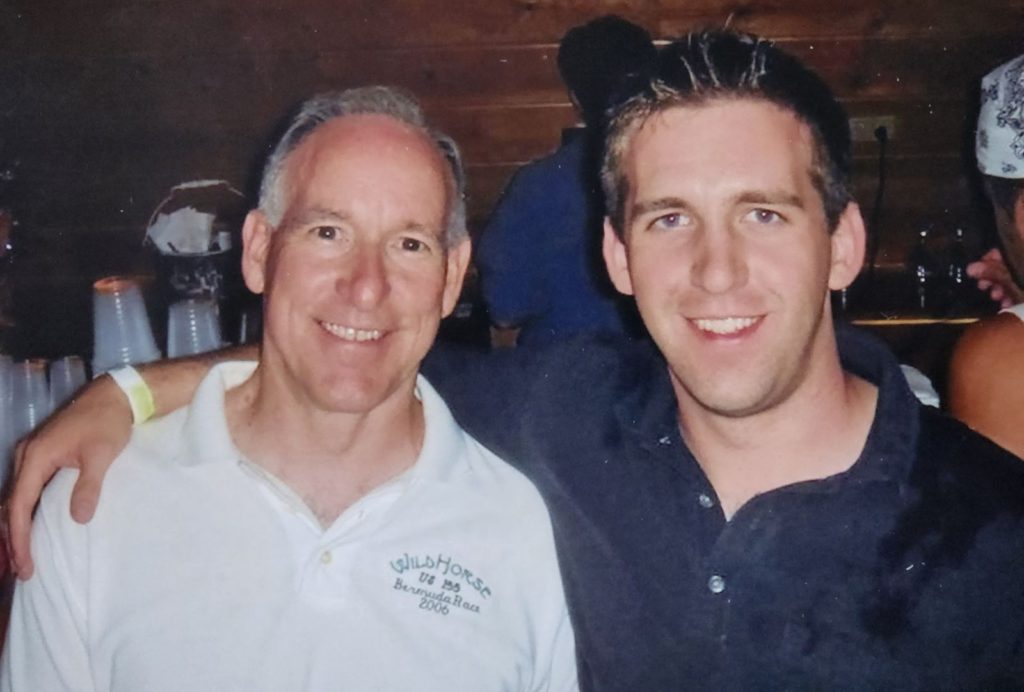
Richard (left) was 53 and his son, Tom, was 26, when they took a Christmas holiday trip to Florida… “Tom and I arrived in Key West, checked into our room, and went out, toured around town, had dinner, and we had a great time. The next morning, I was getting into the shower and Tom was on the bed reading a book. That was my last vision of him.” (photo courtesy of Richard Lueders)
Date and location of poisoning: 12-26-2006, Doubletree Grand Key Resort – Key West, Florida
From the time Tom Lueders was an on-the-go toddler, he and his father, Richard Lueders were always best buddies. When Richard was 53 and Tom was 26, they took a trip to Key West, Florida during the Christmas holidays to escape the winter cold of Michigan and enjoy some boating. It was another occasion they created for father-son bonding, a practice they’d both reveled in for years.
Key West is a world-renowned vacation destination. Richard and Tom were staying at the upscale, Hilton Hotels-owned Doubletree Grand Key Resort, the second-largest hotel in Key West. However, despite the hotel’s noted opulence, the Lueders’ getaway became a tragedy beyond measure.
Around 12 noon on Wednesday, December 27, 2006, the general manager of the Grand Key responded to a blaring smoke detector on the fourth floor. He entered room 416, aware that previous guests had become sick in that room from suspected inhalation of carbon monoxide (CO) gas. (It was later established that CO and smoke could be backdrafted into the boiler room next door to room 416 because of an incorrectly installed vent pipe on the roof.)
The manager found Richard in the shower moaning, according to police reports, and Tom on the bed with a book in his lap, unconscious and unresponsive. When the manager tried to administer aid, he also fell ill. EMTs arrived and rushed the three men to the local hospital, where the manager was treated. Richard Lueders was airlifted to a larger hospital approximately 300 miles away in Fort Meyers where he received emergency hyperbaric oxygen (HBO) treatments and survived. And it was there, the next day, that Richard learned his son was gone. Tom Lueders had been declared dead on arrival at the first hospital.
Everyone who knew Tom says that with his integrity, compassion, and exuberance, he lived every day of his too-short life to the fullest. Richard says that another well-known adage is also true for his son: “‘In the end, life is not measured by the number of breaths we take, but by the moments that take our breath away.’ Tom prioritized his relationships,” says Richard, “and he always took our breath away.”
We strive in this series, The CO Experience Project, to highlight the lasting effects of CO poisoning on families. Permeating the Lueders family’s loss, similar to the Jenkins and Williams stories and so many others, is the awareness of how the hotel industry could have acted to prevent further loss of life from CO poisoning – still the most preventable of all poisoning events.
To fully share the Lueders’ story and its impact on their family, we present it in two parts. The first details what happened at the hotel, the preventable nature of what happened, and what’s happened since.
In part two Tom’s parents, Richard and Beth, and his sister, Katie, share their memories of Tom, how his heartbreaking loss has shaped their lives in the years since, and their ongoing hope for change.
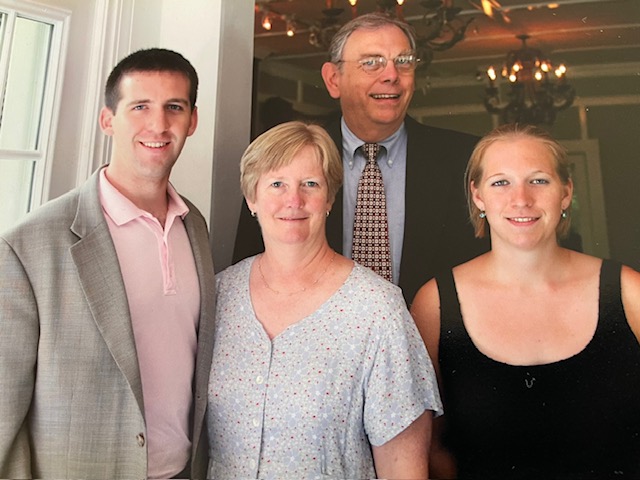
L to R: Tom, his mom, Beth Thomas, his stepdad, Fred Powers, and his sister, Katie Lueders (photo courtesy of Beth Thomas)
Part 1 – The Poisoning: A Disaster in the Making
After Tom Lueders death, the Doubletree Grand Key Resort was forced to close immediately and indefinitely. The incident in room 416 sparked a multiagency investigation with Key West fire and police departments, the state attorney general’s office, state health department, medical examiner’s office, and others. Key West’s city manager stated that they suspected and were examining carefully the fourth-floor boiler room, which was adjacent to the Lueders’ room.
Two days later, December 29, officials in Key West confirmed by autopsy that CO poisoning had killed Tom. The colorless, tasteless, odorless, and deadly CO fumes had in fact come from the boiler room next door to room 416. The boilers were used to heat water for the hotel laundry and the boilers had incomplete and incorrect venting, which under certain conditions, caused huge amounts of CO to flood the area. Testing at the hotel had found abnormally high levels of CO throughout the fourth floor of the Doubletree Grand Key Resort. City officials stated they could not find any record of the boiler room ever having been inspected. Hotels in Key West are required to have their boilers checked every two years, the city manager said.
Also on the afternoon of December 29, Richard Lueders was released from the hospital in Fort Meyers to continue his rehabilitation at home. Susie Lueders, Richard’s wife, had rushed from their home in Michigan to be with him in the hospital. Before going home, they returned to Key West to retrieve belongings and make arrangements for Tom’s body to be returned home.
The Lueders were shocked when they later learned that their tragedy had actually begun six days before they even arrived in Key West. A family from Iowa had stayed in room 416 on December 21, 2006, and were taken by ambulance to the hospital when the whole family became ill. According to earlier reports, rescue workers treated the family for presumed food poisoning.
However, later reports revealed that doctors had determined the family members were suffering from CO exposure with elevated levels of CO in their systems and had sent them to a hospital for HBO treatment. The hospital’s chief operating officer said that at the time they did notify the Doubletree Grand Key Resort of the potential CO exposure, and that police, rescue, and fire personnel were also made aware of the event. However, no investigation occurred at the Doubletree Grand Key Resort, where the family had first reported becoming sick. The Key West fire chief said they never received any information indicating that there was a problem at the Grand Key. He also said that the family had been in a boat and did other activities that could have exposed them to CO before they fell ill at the Grand Key. He concluded that if there had been any indication that the CO gas had come from the Grand Key they would have responded immediately and investigated the problem. The miscommunication and confusing reports about this earlier incident would only become clearer during court proceedings much later.
A week later, on January 4, 2007, the State Fire Marshal began surveying all establishments in Key West that used boilers or hot water heaters to identify problems. The president of the Lodging Association, a trade group representing hotels and lodging in the Keys, said that Tom Lueders death by CO poisoning was the only incident that anyone could remember. She called the death a tragic accident, stating it was a single incident and that she didn’t believe it said anything about the safety of their lodging industry whatsoever.
The same article that contained the Lodging Association President’s remarks in Travel Weekly, a travel industry publication, erroneously stated that CO poisoning deaths are “virtually unheard of at hotels.” The article went on to state that the circumstances surrounding the death had raised questions regarding the thoroughness of city hotel inspections and whether municipalities should mandate that hotels install CO detectors. At that time, Florida was one of many states that did not require CO detectors.
A month after Tom Lueders death, in January 2007, the Florida Department of Business and Professional Regulation admitted it erred in its boiler room inspections at the Doubletree Grand Key Resort, having not conducted them as often or as thoroughly as it should have. This agency was not responsible for inspecting the boilers, however, just for verifying the presence of a certificate showing that the State Fire Marshal’s Office had inspected the boilers. Two different inspectors over the seven years prior failed to cite the hotel for not having the required boiler inspection certificates on display in its boiler room.
What the investigations into the Doubletree Grand Key Resort found was inexcusable – dozens of other guests who had stayed in room 416 or other nearby rooms had become ill and were even hospitalized.
As soon as they were able, Tom’s parents worked with the Florida Justice Association to aggressively pursue a bill to require mandatory placement of CO detectors in hotels and other lodging establishments and, in July 2007, Florida Governor Charlie Crist signed it into law.
However, years later the family’s questions still remain. For example, the hotel industry claims that guest safety is their top priority, but where is the evidence to back that up? Where is the hotel industry’s initiative to protect their guests from CO poisoning, which is crucial to any safety system? Does someone have to die in a hotel before that hotel and the hotel industry overall decide to install CO detectors? When will the hotel industry itself take action and do the right thing?
To the Lueders family, and others who have experienced CO gas – the invisible, silent killer – it is clear that without CO detectors in hotel rooms, guests close a hotel room door to relax and sleep and may have no way to be alerted to the life-threatening danger they may be in.
For Tom’s family, the impact of his loss is unique and ongoing, and each family member carries it in their own way.
Richard carries the loss of his son alongside his own survival of CO poisoning, and it motivates him to action and camaraderie. He maintains close ties with Tom’s best friends through phone calls and annual reunions to get together to celebrate life – Tom’s and all of theirs.
Beth, Tom’s mother, carries on being the generous, loving caregiver she’s always been, as a mother and a career-long nurse, and now a volunteer. Beth is a “stuffie surgeon” at her local public library. Children bring in their favorite, but damaged, stuffed toy and Beth restores the stuffing, replaces the buttons or eyes, and sews up the toys to be good as new. Beth adores seeing the elation when she returns the child’s beloved stuffed toy to them, completely healed and ready to love for years to come.
Katie, Tom’s sister, was only 23 when her big brother died. She struggled with the pain and senselessness of his loss and to find a safe place to cope with her grief. Her sense of justice, fairness, and even goodness in the world was wrenched away. Now Katie carries acceptance and knowledge of the complexity and validity of her feelings. This enables her to cope and to share in remarkable ways. She’s found her place with a group of supportive people, and with her writing and art. With eloquent and powerful expressions of her anger, frustration, sadness, grief, and loss, Katie moves forward.
In addition to his parents and sister, Tom is deeply missed by his stepmother, Susie Lueders, stepfather, Frederick Powers, stepbrothers Douglas and Stuart Powers, and many friends.
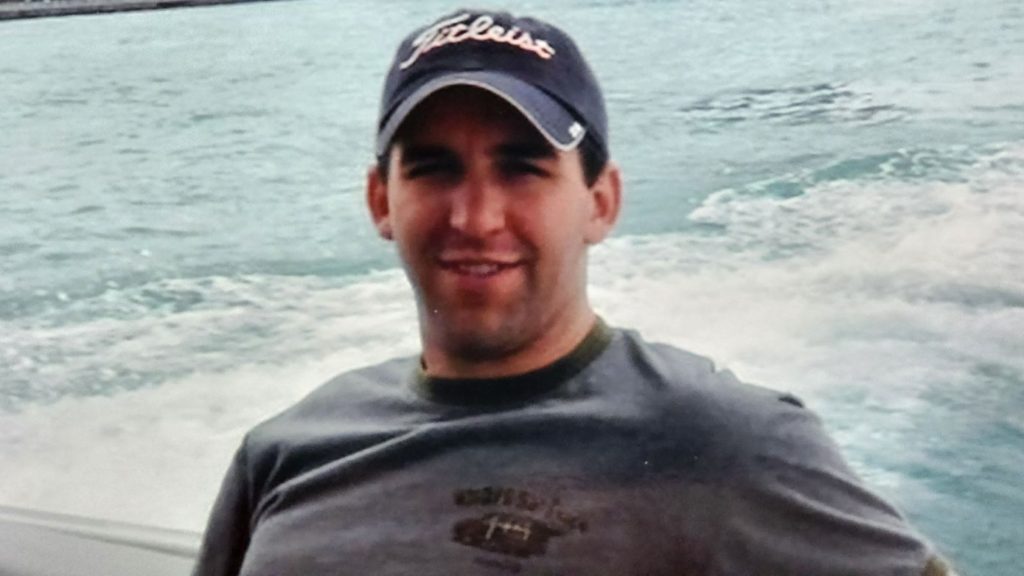
Tom Lueders (photo courtesy of Richard Lueders)
Part II –Remembering Tom and Living with the Questions that Remain
Richard, Beth, and Katie each have their own experiences and distinct voices. Their words stir up emotions and awareness, and like Tom’s short life, will take your breath away.
Tell me about Tom. We’d like to get to know him. What was he like?
Richard (in Michigan): Tom was a young man who always had a friend and always made friends. He wasn’t the life of party, but the guy who could bring everyone together. And Tom loved his family. He valued relationships above all else, family and friends. And his friends say Tom proved it all the time with his presence and actions. I got to know more about Tom and the depths of his relationships after he passed. Within days, I got phone calls from every one of his best friends. I only knew a few, but they all called and told me how much they loved Tom and how much he loved me. One friend said, “You’ve lost a son and you’ve gained another son.” He calls me “D2” for Dad 2. And to this day, we remain close.
In the summer of 2006, Tom and I and a few of his close friends, did a boat trip at Put-in-Bay, Ohio. It was fantastic. We had a great time. The summer after, in 2007, I decided to make it an annual event with Tom’s friends. I told them, I’m doing this again. We’ll get together in Put-in-Bay, we’ll go out on a boat, and you’re welcome to come. They all came from all over – Oregon, San Diego, Saudi Arabia, Singapore. Literally traveling around the world to do this. And we’ve been doing this trip almost every summer. It’s one of the strongest indications of who Tom was. He’d be in his 40s now, like his friends are. His priorities would still be family and friends.
Beth (in Massachusetts): As soon as Tom could stand up, he was on the move, and he preferred to run, not walk. He was never a sitter. He was always active and vibrant. He’d enter a room and he’d know everyone before he left. He was curious and full of energy. He was very positive, and he never wanted to miss an adventure or let an opportunity pass by. Next rocket ship to the moon? Yes, sign me up. He was ready to try anything. He lived life to the fullest every day.
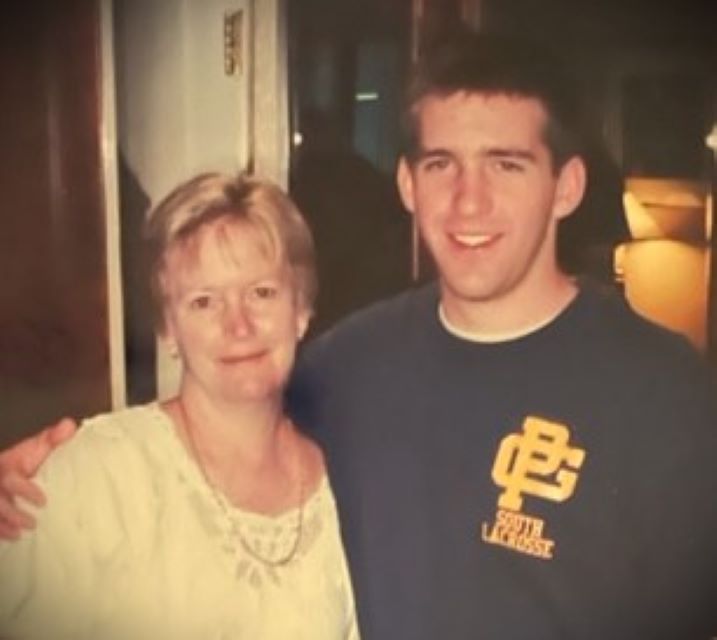
Tom and his mom, Beth Thomas (photo courtesy of Beth Thomas)
For example, Tom started playing soccer at age 4, and he loved it. But around age 14, he was in the hospital the day before an important soccer match and was diagnosed with Type 1 diabetes. He said, “I’ve got a soccer tournament tomorrow.” The doctors told him he couldn’t play then, but he could play in the future. And he did. Tom managed his diabetes expertly. He never complained or said, “Why me?” Instead, he said, “I’ll just deal with it and keep going.” Failure was not in his vocabulary. He wasn’t always successful. He’d say I have to learn from this, try harder, and do better net time.
Tom also had a great sense of humor, and he could be a bit mischievous, but in fun ways. He loved to write, and he was always reading. He liked cartooning, too, as a child and an adult – he loved Calvin and Hobbes.
Tom and Katie fought a lot as children. He’d drive her nuts doing what big brothers do. They were very different and both stubborn, and they both loved to read and learn. As they grew up, Tom became Katie’s biggest protector, and she became his biggest supporter. They had a very strong bond.
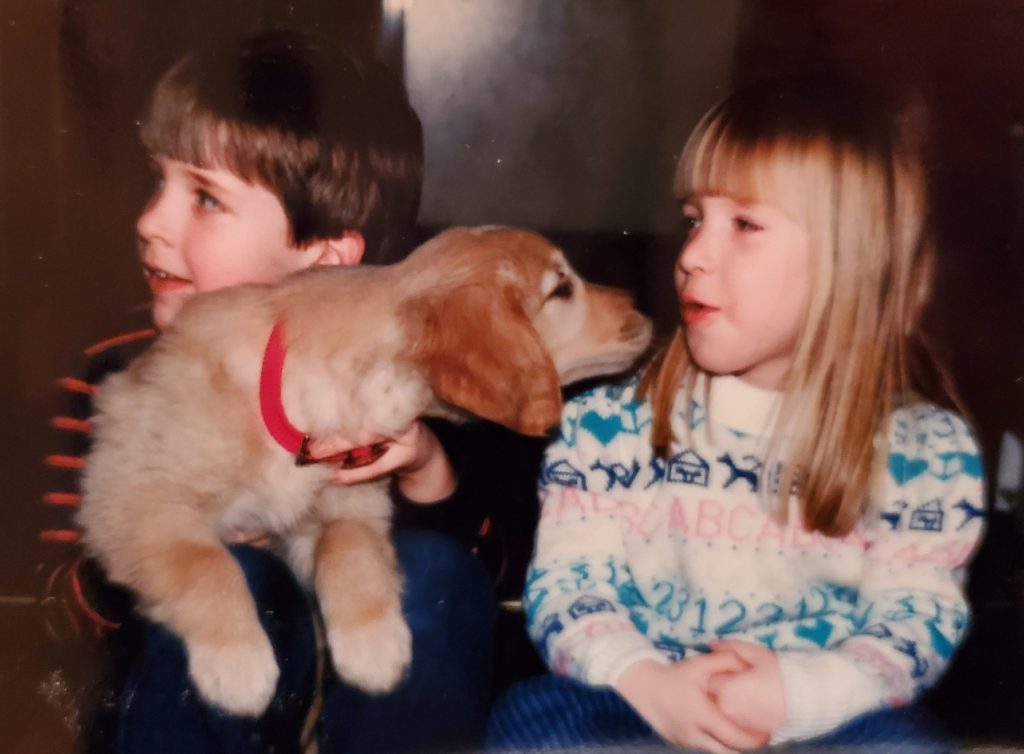
Tom and his sister, Katie, and their dog, Alex (photo courtesy of Katie Lueders)
He did his high school junior and senior years in Michigan to be with his dad. I was instrumental in getting him to go to Boston College, and I was so happy to have him nearby for those years. He’d come home, do laundry, and stay and visit. We’d grocery shop, too, and he’d share all the groceries with everyone in his dorm. It cost a fortune, but I didn’t mind. It was Tom’s way of being generous.
After he graduated, he worked selling health insurance and he really cared for the older people he was selling to. And they loved him! Because I’m a nurse, he’d call me sometimes and ask about some ailment the older person had, and I’d hear their little voices in the background. It wasn’t his job, but he’d help them. We often worked as a team, and it was bonding. I know he was proud of me and what I do. I am very proud to have been his mom and his friend.
He’d be 42 now and I think he’d be married and a dad and have a couple of dogs. He loved dogs. I miss all that. I have faith I’ll see him again. He truly was loved by everyone.
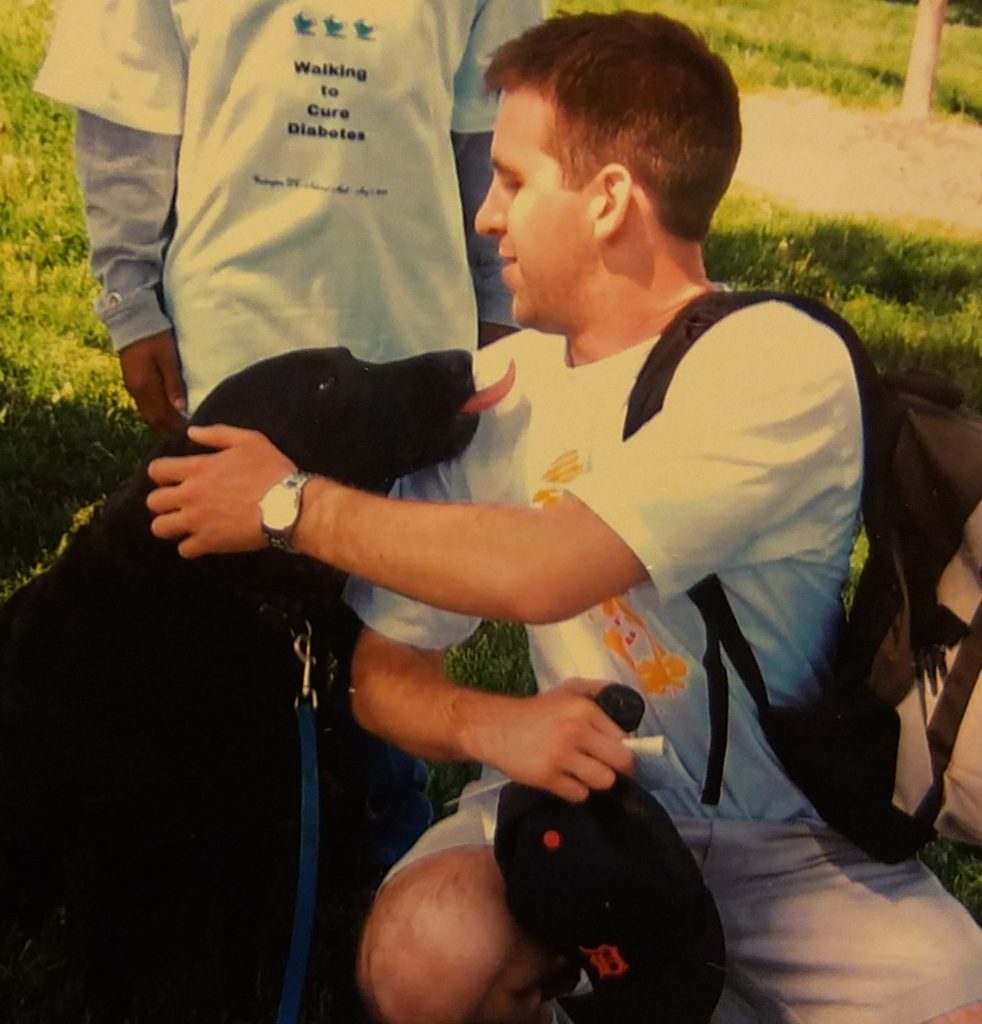
Tom Lueders (photo courtesy of Katie Lueders)
Katie (in Massachusetts): Tom was ambitious and very tenacious. There are things I didn’t know about him until after he passed. He was determined and could overcome anything. He’d set his mind to it and saw things through. It’s hard to think of anything that ever defeated him. He was athletic, always played soccer, and was always trying to reach for bigger and better. He’d build the skills in himself to achieve what he wanted. He never settled for whatever level he was at; he was always climbing.
He was a very talented cartoon artist. I love his drawings. And his big sense of humor meant he was always joking and pulling pranks and picking on his little sister. I’d get upset and our mom would say, “Just ignore him, siblings get in each other’s ways sometimes.” I visited him in (Washington) D.C. and got to see him in his life there. We were close. We’d talk on the phone a lot, and I always looked forward to seeing him. We really respected each other as young adults, no longer bickering siblings. We’d share a lot about our lives, and we knew what was happening with each other. I’m really glad I was in that place with him. We knew each other better as people and got along really well.
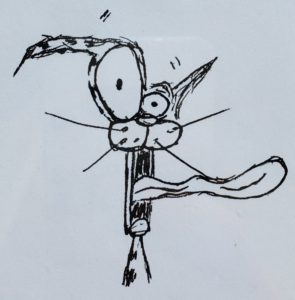
One of Tom’s many cartoon drawings (courtesy of Katie Lueders)
It’s difficult, but I want to ask about the CO poisoning incident. If you can please share what you remember to help us understand what happened for you.
Richard: Tom and I arrived in Key West, checked into our room, and went out, toured around town, had dinner, and we had a great time. The next morning, I was getting into the shower and Tom was on the bed reading a book. That was my last vision of him.
I remember distinctly being in the shower and I noticed something was odd. I can’t raise my arms. Weird. No alarms bells went off in my head, I just thought, “Wow, I can’t raise my arms.” I’d lost the ability to be rational and logical. Then I fell and I heard Tom say, “Dad, you OK?” I’m now laying in the shower, totally irrational, saying, “Yeah. I’m OK.”
I woke up much later in an HBO chamber in Fort Meyers. I was life-flighted there. I have no memory of any of that. Many hours passed before I knew Tom didn’t wake up. I was still incoherent and I kept asking what happened to Tom. Susie was with me and told me. It is not the natural order of things to bury your children.
CO gas is so deadly – you lose the ability to think rationally first. No rational person would lose their ability to raise their arms and think, “Oh, I’m OK.” That happened to me.
After many years, I’ve put it together as best as I can. And if there’s a silver lining for me, Tom went to sleep reading a book. I’m fairly confident of how his story ended.
Beth: Tom had called me on Christmas and told me a little bit about being in Key West on their father/son trip. Two days after Christmas, I’d just come home from work and got a call. Rick’s wife (Susie) called me and said Tom had died and Richard was seriously injured. There’s been an accident, carbon monoxide maybe. I don’t know. All I could remember is they couldn’t revive Tom and Rick was in hospital. It was such a shock in the moment and for days after.
Katie was living with us at the time. She came home later and asked, “What’s wrong? What’s wrong?” I couldn’t say it, and then finally I said, “Tom’s gone.” It’s a blur, but Katie was the one who told our close friends. I couldn’t talk to anyone. I was in shock for days.
Rick got out of the hospital, he and Susie got home, and right away he was insisting we have to do something so this never happens to anyone again. He said, “Somebody needs investigate. We have to get evidence. Who’s culpable?” He started interviewing law firms, and he got a very respected large firm that was excellent. We also decided early on we wanted a vehicle for getting the laws changed in Florida. I knew it was important to create something good out of a horrible situation.
Katie: I was living with Mom and my stepdad at the time. No one had cell phones yet, so I came home and checked the voicemail messages and there was a weird message from Dad’s neighbor in Michigan, saying something had happened, please call. I immediately called her and she said, my mom knew what was going on now, so talk to her. I hung up and yelled out to my mom and went upstairs to her. She was crying on the bed, and said Tom had passed and Dad was in the hospital. Dad was OK. Tom had passed away.
I reacted shocked, crying, I didn’t believe it. I don’t know when I did start to believe it. It was a weird space – he’s right here, how can he be dead? Surreal.
My stepdad came home. It was very confusing, stressful, a terrible time. I was working at a health club, and also at Earthwatch. I was 23. For days, weeks, I remember having so much energy I couldn’t sit still, completely restless. All you can think about all the time. A lot for a body to contain. I couldn’t sleep or be still and I was so exhausted and I couldn’t put two words together. Exhausted, frantic, exhausted, frantic, exhausted.
What was odd? What doesn’t make sense? What are the mysteries for you?
Richard: It was important for me and all of us to understand what had happened, what actually went wrong. Eventually we learned that months before a hurricane had come through and damaged the venting for the hot water boilers in a room right next door to our room. The exhaust vent pipe on the roof was damaged, blown off, and the hotel maintenance guy replaced it with a gooseneck pipe, not a straight pipe. So we discovered that if the wind would blow in a particular direction, the CO gas would get pushed back into the boiler room by the wind instead of blowing out. That was the underlying cause. The previous family in our room that was impacted by CO was because the wind was blowing in that particular direction. The CO testing they did wouldn’t register anything if the wind wasn’t blowing that certain way. The construction of the room was also not up to code, and CO leaked through the walls because they weren’t sealed. But if the exhaust on the roof had been correctly replaced…
The CO level in my blood was extremely high, but I believe the reason I didn’t die in that room was because the bathroom door was closed and the shower water was running on me for an hour or more. It’s painful to even think about.
Beth: What was odd for me is why? Why? I wonder why people are so stupid. The exhaust on the roof is damaged after a hurricane, and they had the hotel handyman go to Home Depot and buy stuff and fix it. It was not fixed properly. It vented back into boiler room in the building. They suspected CO gas for the other people who stayed in that room a few days before. Why did the hotel management do nothing? Nothing happened except the manager lost his job. He’s the person who made bad decisions. He was stupid and uninformed. And he’s walking around a free man. He’ll never work in the hospitality industry. And in his mind, he knows he indirectly caused someone’s death. I bear no ill will about him; he made ignorant decisions.
Katie: The number one thing for me was why no one was ever held criminally responsible. Two families sickened in same room, days apart, Tom dies, and there are no charges, no trial, nobody held accountable. It was a horrible lesson of how our justice system fails. All these scenarios were given of why it happened, but I believe there’s plenty of evidence of negligence and someone should have been charged and put on trial. Instead, all those involved get to go on living. It’s reckless for the hotel industry to not to do something. Why on earth aren’t they doing anything about CO? It’s more dangerous than fire! Why wouldn’t they do something on their own volition to prevent CO poisoning? It’s not even a concept for them and people have been dying from this for a very long time and it will continue because not enough is being done. It surfaces again and again.
No lawsuit or settlement is ever adequate. It’s a difficult process. Was the lawsuit meaningful?
Richard: It was meaningful to me because … it may sound strange, but multiple parties were involved in the culpability of what happened. At one point, Beth and I were in a conference room in Florida with almost 100 people there from the insurance company, the hotel management, the contractors, all the lawyers. And in that context, I stood up and said point blank, “Nothing we do here will bring my son back. Nothing. It will help you remember what happened to Tom and our family.” I thought afterwards, if those 100 people, if each of them told two people, that would make a difference, at least for those people.
Beth: The law firm knew what they’re doing and that really helped. They collected evidence before anything moved in that room or the hotel, and they got the lawsuit going quickly. We met with the State Legislature and the other family’s story was added to the overall lawsuit. Also, with the legal case and settlement, the law firm helped us go through the legislative process to require by state law that hotels in Florida have CO detectors. We met with the governor and testified before the legislature, and a law was passed (July 2007). I was still in a lot of grief, and it still feels like a blur despite it happening over 16 years ago.
Katie: I’m so proud that my parents were able to drag themselves through that really emotional and difficult process to help this not happen to other people. They persevered.
I wish there was a lot more focus on the hospitality industry, that despite lawsuits like ours, there’s little effort from them to prevent this – and there needs to be. CO poisoning will continue to affect people until they change. I want there to be awareness of how dangerous CO poisoning is and that nothing is changing or getting better. And now its Airbnb and VRBO properties, too.
But what is the hospitality industry doing? Have any hotel chains invested in and been vocal about CO prevention? It appears they haven’t made adequate adjustments to prevent this from happening to somebody else. For any hotel to not require CO detectors on their property as a company standard is deliberate and irresponsible inaction. It’s pure negligence, and that recklessness is deadly.
(Note: On May 4, 2007, the Florida state attorney announced that his office would not file criminal charges against the Doubletree Grand Key Resort in Key West. He explained in a statement that his office could not prove beyond a reasonable doubt that Tom Lueders death was a criminal act caused by the hotel management being grossly negligent or indifferent to the lives of their guests.)
The fact that nobody was criminally charged and there was no trial for what happened was a second trauma. My brother’s death was dismissed. The negligence and lack of accountability is unbearably unjust and makes me furious – for Tom. The lack of charges put others at risk for the same awful scenario to happen again. When this kind of crime goes unpunished, the hotel industry seems to shrug and change nothing. Again, my brother was not the first, or last victim of CO poisoning in a hotel.
Are there resources you had, or wish you had, that helped?
Richard: I was trying to deal, day to day, and I felt swallowed up. My wife and family were supportive and I took advantage of counseling, which was helpful.
Beth: I joined the Compassionate Friends group, which is parents, siblings, grandparents, who’ve lost family member. It helped me to talk to other parents. What other people didn’t get, they understood as parents who’d lost a child. It’s the worst thing in the world and you make things better for others by getting them to understand. I empathize better, I’m paying back, and I get a lot of pleasure out of that.
Katie: I finally joined a grief support group, Compassionate Friends, and that’s been helpful. My mom told me about them. I still feel separate from others in my grief because no one was held accountable. I wish there were more people I could relate to about that. It takes a long time to find words that fit what I feel. I’m better now nailing down my feelings and what I want to say, but I wish I had found words to express myself earlier.
What did you expect that you didn’t get? Or maybe, what did you get that you didn’t expect?
Beth: I believe I expected – but didn’t get – some assurance that future hotel managers would be more educated about CO poisoning and have resources they can call upon if something is happening in the hotel that they don’t understand. The hotel manager in our situation made multiple poor decisions, any of which if made differently, could have altered the outcome.
Katie: The questions I still have are frustrating and surprising to me. They never go away. I thought with the investigations a lot would be buttoned up and explained, but questions still rap through my brain and there may never be answers. I didn’t expect to still be wondering.
I also didn’t expect to have people I could relate to about it. And now I do. I was 23 and losing Tom in this way certainly separated me from my relationships then. A sense of normalcy was gone. It was really hard to relate to people my age. Now, eventually, I’m finding people I can really share the hardness of my situation with and that’s become a big source sanity.
What don’t other people understand? What don’t they know, or get?
Richard: It’s not about Tom per se or my situation, it’s the simple reality that if you’re near any source of CO you’re not safe. I own boats, they’re CO generators, and a car, a furnace. That’s the most deviling thing is that there’s no national requirement even for hotel rooms, as there is with smoke detectors. It’s eternally frustrating. The company I worked for at the time did an in-house story about what happened to me and Tom. I highlighted the fact that a $30 CO detector would have saved us. Another employee called me to tell me I’d saved his life. He put new batteries in the CO detectors in his house and they all went off not long after. A dead squirrel was lodged in an exhaust vent. None of my family traveled with CO detectors before. Now we all do. I tell people it’s 30 bucks. If it never goes off, so what; and if it goes off once, it saved your life.
Beth: People still have the attitude that it couldn’t happen to them. Even in private homes, people don’t properly use CO detectors. And they are unaware of places and situations where CO happens – like hotels. My husband is a private pilot and we take a CO detector because we’re sitting right behind the engine. Pilots could make a bad decision in flight due to CO poisoning. CO detectors save lives. I can’t solve all the problems of the world, but people lack understanding, and they must become more aware.
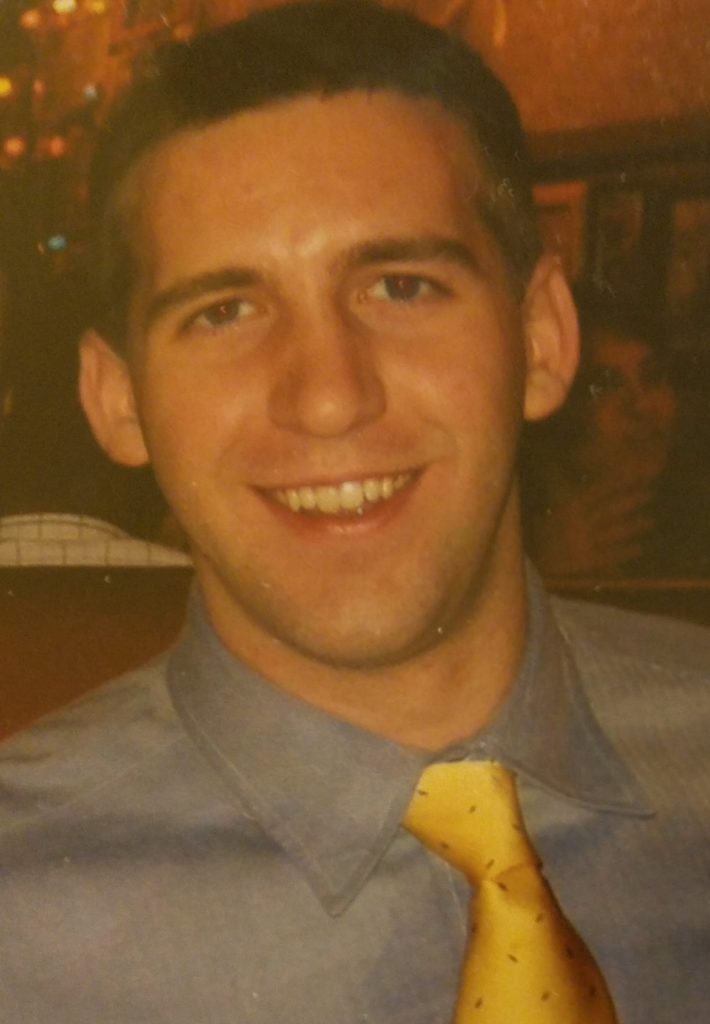
Tom Lueders (photo courtesy of Katie Lueders)
Katie: I think sometimes people assume that because Tom’s death was years ago, why haven’t I moved on? There’s no resolution. He was gone yesterday, he’s gone today, and he will still be gone tomorrow. This is lifelong grief for us. I wish others had a better understanding of the permanence of grief. Tom’s absence is permanent and so is grief. I call it “daily devastation.” The emergency of what happened has receded; the tragedy of it has not. I integrate Tom’s loss into my life; it doesn’t feel good, and I don’t have good attitude about it. But I go forward.
Grief evolves on its own. Others connected to Tom have milestones and important moments in their lives, but Tom doesn’t get to have those. Grief evolves and becomes hurtful in new ways. Grief has such a wide radius, and it effects so many structures in life – a feeling of safety or a sense of justice in our world.
What’s meaningful to you today? About this story? About your life now?
Beth: I do some part-time nursing work and I have some opportunities to work with college students and it’s great. I feel really good about my work and the care I’ve given to others. Even though I’m not the first and won’t be last to have a loss like this, I have helped people. And I love being a stuffie surgeon at the library.
Katie: Writing is important to me and I make art. These are good creative outlets. I work in public pool administration, and I do catering. I also started a creative writing workshop. I love swimming and I love to write.
Anything you want to say that we haven’t discussed?
Katie: I wish that when I tell people about my brother, that I didn’t have to include something so tragic. It eclipses who he was. And it never had to be this way. I should be telling people about where he lives, and what he’s doing and thinking about. It was such an abrupt and terrible ending.
Richard: We need a national standard in our country so that not just smoke detectors are mandated by law, but CO detectors, too. We’ve made some progress in Michigan. And wouldn’t it be great to not have any objections from anyone or any industry or any group? That’s our wish.
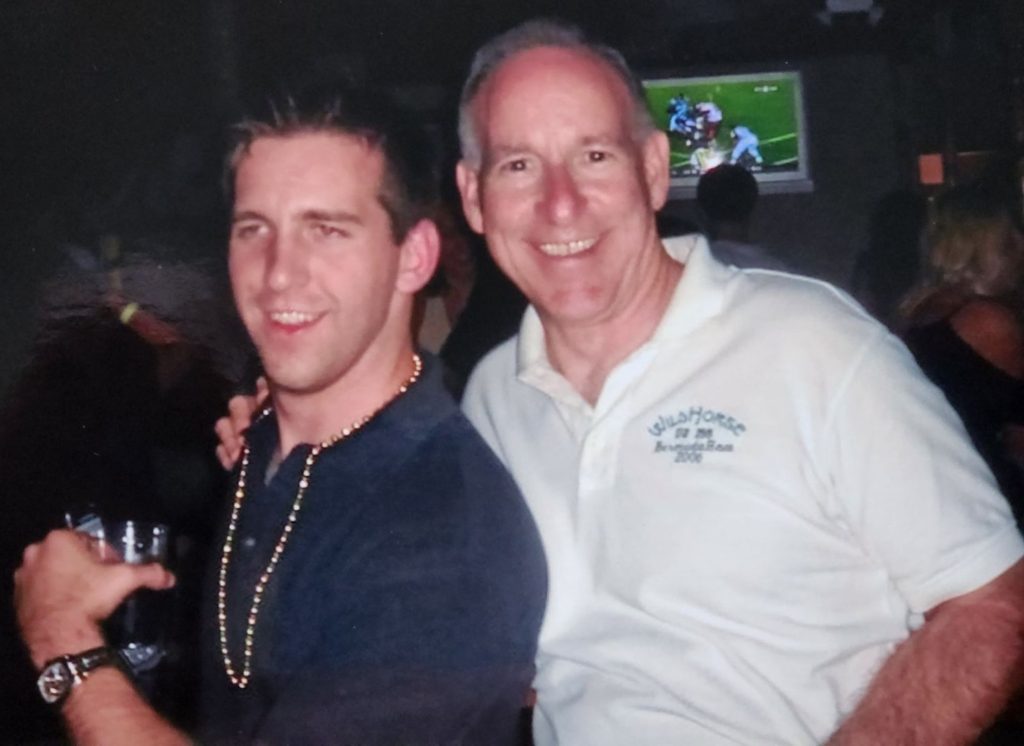
Tom (left) and his dad, Richard (photo courtesy of Richard Lueders)
References
Terry Aguayo, “Florida: Hotel is Sued Over Carbon Monoxide,” The New York Times, Jan. 4, 2007.
Associated Press. “Hotel’s Toxic Fumes May Have Sickened Others Before Death,” Ocala StarBanner, Jan. 2, 2007.
Cammy Clark, Evan Been. “The 216-room Doubletree in Key West, Florida Closed Indefinitely; Multiple Agencies Investigating Death of Hotel Guest,” The Miami Herald, McCatchy-Tribune Business News, Dec. 29, 2006.
Abby Goodnough. “Autopsy Confirms Carbon Monoxide Fumes Killed Guest at Hotel,” The New York Times, Dec. 30, 2006.
Leesfield Leighton & Partners. Press release. “Governor Charlie Crist Signs Life-Saving Carbon Monoxide Detection Bill,” Business Wire, July 24, 2007.
Adam Linhardt. “More Hotel Suits Filed,” Key West Citizen, KeysNews.com, Feb. 7, 2009.
Lueders, personal communication, August 7, 2023.
Michael Milligan. “Officials Continue to Probe Death at Doubletree in Key West,” Travel Weekly, Jan. 29, 2007.
Office of the State Attorney, 16th Judicial Circuit. Press release. State will not prosecute hotel in carbon monoxide death. May 4, 2007.



